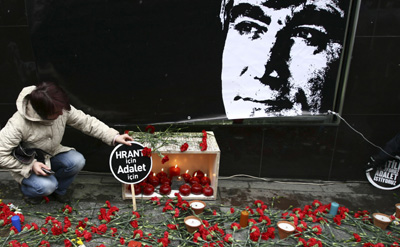On January 19, 2007, Hrant Dink, the founder and editor-in-chief of the Armenian-Turkish weekly Agos, was gunned down in front of his office building in Istanbul. The murder sent shockwaves through the Turkish and international human rights and press freedom communities. It also triggered a mobilization of thousands of Turkish intellectuals, activists, and citizens that marched through the streets of Istanbul under banners claiming “We are all Hrant Dink.”
A suspect, 17-year old Ogün Samast, was arrested the day after the killing and has been held in a detention centre since. Nineteen other people have also been charged of being complicit in the crime, including accused masterminds Yasin Hayal and Erhan Tuncel.
The trial, however, has been dragging on for four years. “We are concerned that the truth will be covered up as it typically happened in the cases of other journalist murders in the past,” wrote the Turkish journalists’ association on the day of the fourth anniversary of the killing. “We are worried that the trial will be made to reach the statute of limitation.”
The race against time and the battle against impunity however have taken on a new international dimension. Fearing a “judicial burial” of the case, the Paris and Brussels bar associations and Reporters without Borders (RSF) have decided to turn up the heat on Ankara.
On January 19, hundreds of French and Belgian lawyers, parliamentarians, members of Armenian associations and prominent public intellectuals like Bernard-Henri Levy and Michel Onfray signed an open letter that expressed doubts on the will of the Turkish authorities to do justice.
Their initiative was based on firm legal grounds. On September 14, 2010, the European Court of Human Rights–to which Turkey is accountable as a member of the Council of Europe–gave its verdict on the Dink case and condemned Turkey for “violation of the right to life, the right to freedom of expression and the right to effective legal recourse.”
“Turkish authorities were warned that ultranationalists were plotting to kill Dink but failed to act,” said the court. “Turkish security forces could reasonably be considered to have been aware of the intense hostility towards Hrant Dink in nationalist circles. None of the three authorities informed of the planned assassination and its imminent realization took action to prevent it.” The court also criticized, in the words of Turkish daily Today’s Zaman, “Turkey’s inability to carry out an effective investigation to expose and punish those who neglected to protect Dink by not acting on available intelligence.”
In early February, representatives of the Brussels and Paris bar associations as well as Helène Flautre, the influential co-chair of the EU-Turkey Joint Parliamentary Committee and former president of the European Parliament human rights subcommittee, went to Istanbul to observe the 12th session of the trial.
Thanks to this renewed international interest the ball of justice seems to be rolling…a bit less slowly. Despite a series of incidents that marred the serenity of the hearing the international observers chose to highlight some encouraging signs. As reported by RSF after the hearing, prosecutors announced that “a preliminary investigation had been launched into some 30 senior members of the Istanbul and Trabzon police and the intelligence services in connection with Dink’s murder.” Most of the defendants hail from Trabzon, in the northeast of the country. The prosecutor’s office also warned that police who had failed to carry out investigations would be prosecuted. Two defendants, Erhan Tuncel and Yasin Hayal, were ordered to remain in detention. According to Today’s Zaman, Turkish President Abdullah Gül also ordered the State Audit Institution to investigate Dink’s assassination. Turkish and European personalities and groups rallying around Dink’s family however remain cautious and skeptical.
The Dink case is of crucial significance for Turkey. Over the years Dink had become a symbol of dialogue and democracy in Turkey. Boldly addressing the contentious issue of the “1915 Armenian massacres” (a tragedy that Dink, like several national Parliaments in the EU, characterized as genocide), he actively campaigned for Turkish-Armenian reconciliation and was a strong backer of Turkey’s EU membership.
Dink had received the support of leading Turkish liberals who shared his vision and efforts for truth and reconciliation. They also lauded his courage to expose Turkey’s “Deep State,” a coalition of ultranationalists ensconced in the military, the security services, and the judicial establishment.
For Dink’s supporters the slow pace of justice in the murder trial demonstrates the resilience of the Deep State and its capacity to act behind the scenes to abort investigations and assure impunity for the murderers and their sponsors.
According to the Dink family’s lawyer, Fethiye Cetin, “The murder was not the work of four of five youths who acted spontaneously out of nationalistic impulses. The state is implicated at all levels, beginning with the army high command, the judicial system, the government, the police, the media and paramilitary forces. All the political actors had a role in his murder, either to cover it up or to prevent the identification of those who were truly responsible.”
In a country with a strong and militant nationalist movement, writing about Dink’s murder remains a risky business. Journalists investigating the murder, like Nedim Sener and Kemal Göktas, have been harassed by the judiciary. In late January, journalist Adem Yavuz Arslan, author of a book on Dink’s murder–The Secrets of the Operation Dink–was the target of death threats: An envelope containing four Kalashnikov bullets and a white beret similar to the one worn by Dink’s alleged killer was sent to his home.
Despite–or rather because of–this atmosphere of intimidation and impunity, the Paris and Brussels bar associations are determined to increase their pressure on Turkish authorities and help Dink’s family in their quest for justice.
(Reporting from Brussels)
